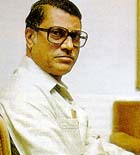Commentary/Mani Shankar Aiyar
At whose behest was Gopalakrishnan given extensions?
The finance minister apparently agreed because he told the Rajya
Sabha in his reply to the debate: 'It is a case of bad management;
it is a case of poor supervision; it is a case, to some extent,
of failure of the ministry of finance to be vigilant at the appropriate
time. It is failure of all those who were key players in the system.'
 Having thus shuffled the blame on to everyone but himself (since
he became a 'key player' only after Gopalakrishnan's
term ended), the finance minister was allowed by his interrogators
to get away from the House without answering the key questions
put to him by previous speakers.
Having thus shuffled the blame on to everyone but himself (since
he became a 'key player' only after Gopalakrishnan's
term ended), the finance minister was allowed by his interrogators
to get away from the House without answering the key questions
put to him by previous speakers.
Which were, to quote the initiator of the debate, V Narayananswamy:
'As far as Indian Bank is concerned, loans were advanced
to politicians very generously... I want the honourable minister to
come to the House with the details of the people against whom
loans were advanced and who have not paid back. The details have
to be laid on the table of the House.'
The demand was echoed
from the opposite end of the political spectrum by the finance
minister's party colleague Jayanthi Natarajan, who asked him to
'publish the list of borrowers, especially politicians, whose
loans have been written off due to political pressure on the banks'.
The finance minister did not oblige because the law on banking
gives finance ministers the fig-leaf of banking confidentiality
to hide the misdeeds of their political peers.
I have a solution to the conundrum. Since all the politicians
who are rumoured to have been illegitimate recipients of Gopalakrishnan's
favours are either of the TMC or the DMK, why not ask the finance
minister to furnish the House with a list of all DMK/TMC members
of the central and state legislatures who are not beneficiaries
of such largesse either in their own name or in the name of close
relatives?
The other point the finance minister failed to answer was Satish
Agarwal's demand that the finance minister 'must not hesitate
to order a high-level investigation or set up a judicial commission
to look into this'. Yes, indeed, why not? Consider the scale
of the scam:
The department of supervision of the Reserve Bank of India
reported in August 1996 that for 1995-96 alone, Indian Bank's
losses amounted to Rs 13.364 billion. This loss in a single year
wiped out the entire net worth of the bank (Rs 10.66 billion) comprising:
capital -- Rs 6.54 billion; reserves -- Rs 4.12 billion. This is, apparently,
the largest loss ever recorded by any nationalised bank in a single
year.
The accumulated losses of Indian Bank amounted in March
1996 to Rs 17.1298 billion. Of this total accumulated loss, losses
in the last year of Shri Gopalakrishnan's tenure accounted for
three-quarters of the total losses. Also, Indian Bank's contribution
to the net losses of all nationalised banks put together amounts
to over one-half of all losses. Such is the damage done by one
bank alone.
The other point the finance minister failed to answer was R Margabandhu's:
'Sir, the former finance minister, Dr Manmohan Singh, and
the governor of the Reserve Bank of India, Dr C Rangarajan, had
put in writing, objecting to the grant of extension to Mr Gopalakrishnan.
In spite of that, extension was given to him. At whose instance
was the extension given? Whosoever is responsible for that is
an abettor in this serious crime.' What are the facts?
In 1988, when Gopalakrishnan's appointment as CMD, Indian Bank,
was being considered, Kumari Vishwanathan, executive director,
RBI, had recommended against his appointment citing adverse reports
against him. In 1992, RBI's department of banking operations and
development expressed its displeasure at Gopalakrishnan's
banking practices. This displeasure was brought to the attention
of the Prime Minister's Office.
Nevertheless, Gopalakrishnan was
repeatedly granted extensions. It has been reported that during
Gopalakrishnan's tenure, 12 cases were filed against him. It was
also reported that the then finance minister, Dr Manmohan Singh,
had recommended against his extensions. None of this, it would
appear, stood in the way of the extensions granted to Gopalakrishnan.
Hence the relevance of Margabandhu's unanswered question.
|





 Having thus shuffled the blame on to everyone but himself (since
he became a 'key player' only after Gopalakrishnan's
term ended), the finance minister was allowed by his interrogators
to get away from the House without answering the key questions
put to him by previous speakers.
Having thus shuffled the blame on to everyone but himself (since
he became a 'key player' only after Gopalakrishnan's
term ended), the finance minister was allowed by his interrogators
to get away from the House without answering the key questions
put to him by previous speakers.